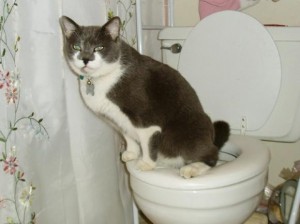Avoid Toilet Disasters: Don't Flush Cat Poop Down Your Toilet - Expert Guidance
Avoid Toilet Disasters: Don't Flush Cat Poop Down Your Toilet - Expert Guidance
Blog Article
They are making a few good pointers related to Can You Flush Cat Poo or Litter Down the Toilet? as a whole in this content followed below.
Intro
As cat owners, it's important to bear in mind just how we take care of our feline friends' waste. While it might seem hassle-free to purge pet cat poop down the bathroom, this method can have harmful repercussions for both the environment and human health.
Alternatives to Flushing
Thankfully, there are much safer and much more responsible means to dispose of feline poop. Think about the following choices:
1. Scoop and Dispose in Trash
The most common approach of taking care of cat poop is to scoop it right into a naturally degradable bag and toss it in the trash. Make sure to make use of a dedicated trash inside story and deal with the waste immediately.
2. Usage Biodegradable Litter
Choose naturally degradable pet cat litter made from materials such as corn or wheat. These trashes are eco-friendly and can be safely gotten rid of in the trash.
3. Bury in the Yard
If you have a lawn, think about hiding feline waste in an assigned area away from vegetable gardens and water sources. Make certain to dig deep adequate to prevent contamination of groundwater.
4. Install a Pet Waste Disposal System
Purchase a family pet garbage disposal system especially created for cat waste. These systems make use of enzymes to break down the waste, lowering smell and environmental influence.
Wellness Risks
Along with ecological concerns, flushing pet cat waste can additionally posture health threats to people. Cat feces may include Toxoplasma gondii, a bloodsucker that can cause toxoplasmosis-- a potentially severe health problem, specifically for pregnant ladies and individuals with weakened body immune systems.
Ecological Impact
Flushing cat poop introduces hazardous pathogens and bloodsuckers right into the water, posing a substantial danger to water ecological communities. These impurities can negatively affect aquatic life and compromise water quality.
Verdict
Liable animal possession extends beyond offering food and shelter-- it additionally entails correct waste monitoring. By avoiding purging cat poop down the toilet and selecting different disposal methods, we can reduce our environmental impact and safeguard human health and wellness.
Why You Should Never Flush Cat Poop Down the Toilet
A rose by any other name might smell as sweet, but not all poop is created equal. Toilets, and our sewage systems, are designed for human excrement, not animal waste. It might seem like it couldn’t hurt to toss cat feces into the loo, but it’s not a good idea to flush cat poop in the toilet.
First and foremost, assuming your cat uses a litter box, any waste is going to have litter on it. And even the smallest amount of litter can wreak havoc on plumbing.
Over time, small amounts build up, filling up your septic system. Most litter sold today is clumping; it is made from a type of clay that hardens when it gets wet. Ever tried to scrape old clumps from the bottom of a litter box? You know just how cement-hard it can get!
Now imagine just a small clump of that stuck in your pipes. A simple de-clogger like Drano isn’t going to cut it. And that means it’s going to cost you big time to fix it.
Parasitic Contamination
Believe it or not, your healthy kitty may be harboring a nasty parasite. Only cats excrete Toxoplasma in their feces. Yet it rarely causes serious health issues in the cats that are infected. Most people will be fine too if infected. Only pregnant women and people with compromised immune systems are at risk. (If you’ve ever heard how women who are expecting are excused from litter cleaning duty, Toxoplasma is why.)
But other animals may have a problem if infected with the parasite. And human water treatment systems aren’t designed to handle it. As a result, the systems don’t remove the parasite before discharging wastewater into local waterways. Fish, shellfish, and other marine life — otters in particular — are susceptible to toxoplasma. If exposed, most will end up with brain damage and many will die.
Depending on the species of fish, they may end up on someone’s fish hook and, ultimately on someone’s dinner plate. If that someone has a chronic illness, they’re at risk.
Skip the Toilet Training
We know there are folks out there who like to toilet train their cats. And we give them props, it takes a lot of work. But thanks to the toxoplasma, it’s not a good idea.

As a reader about How to Dispose of Cat Poop and Litter Without Plastic Bags, I assumed sharing that information was a good thing. Enjoyed reading our posting? Please share it. Let others find it. Thanks a lot for your time spent reading it.
Visit Page Report this page